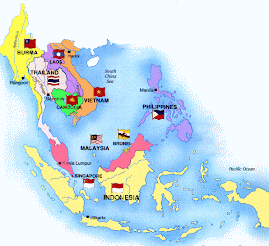On Friday and Saturday this week, I visited the team at the Malaysian Palm Oil Board (MPOB... the research arm of the Malaysian palm oil industry) who were assembling the first BEK in Malaysia. This may also be the first BEK in SEA but, as
previously reported, GEK has arrived already in the Philippines.

This initiative is part of the biochar research collaboration between MPOB and UniKL MICET, as reported previously by Dr Robert Bachmann (BIG-SEA, 18Jan11).
"The BEK (Biochar Experimenter’s Kit) is a reconfiguration of GEK components to create a multi-mode pyrolysis machine for characterized biochar and bio-oil making. The BEK supports multiple pyrolysis process modes in direct combustion (updraft, TLUD and stratified downdraft), indirect combustion retort, and sweep gas through bed heat transfer." (
BEK website)
 |
| 1st run on palm kernel shell |
Jay from ALL Power Labs in Berkeley, California was on hand to guide the assembly process and provide some initial training. The first solids consumed by the BEK were
palm kernel shell, one of the more easily digestible biomass waste feed-stocks from the PO industry. More difficult wastes such as EFB will be targeted for production research and soil trials. More on this in the future, as BEK develops an appetite for a high fibre diet (the baby currently does not have any teeth).
 This initiative is part of the biochar research collaboration between MPOB and UniKL MICET, as reported previously by Dr Robert Bachmann (BIG-SEA, 18Jan11).
This initiative is part of the biochar research collaboration between MPOB and UniKL MICET, as reported previously by Dr Robert Bachmann (BIG-SEA, 18Jan11).




